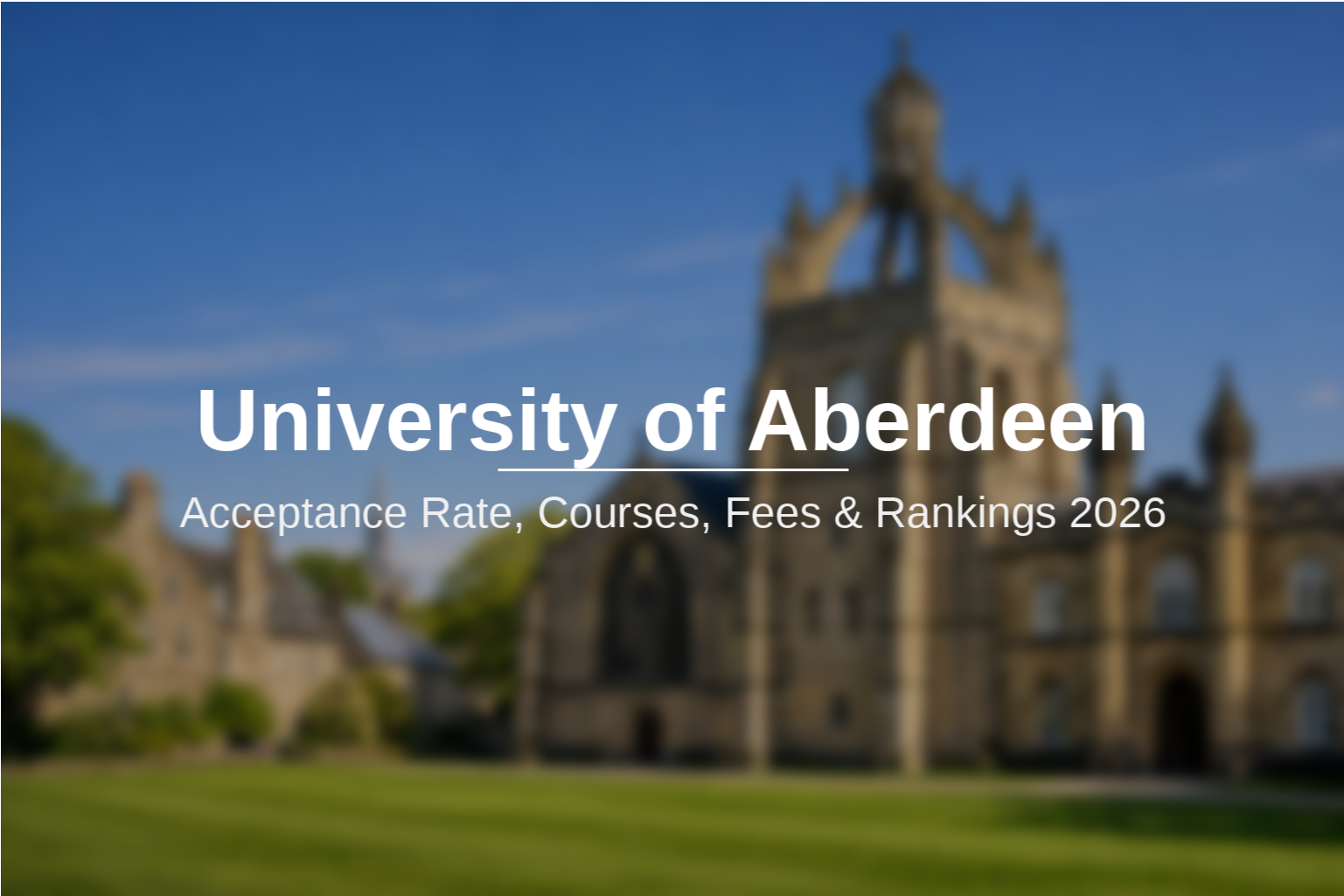The UK is one of the most popular countries to study in, especially for undergraduate applications, and the number of applicants is gradually increasing. Recently, undergraduate admissions to UK universities have entered the “white-hot” stage, but many students have yet to receive offers from their preferred universities, leaving them worried about missing out on their studies. In fact, as early as a few days ago, many British universities opened clearing admission sessions, and booking student accommodation has become a problem for many students. Don’t worry; uhomes.com will take care of that for you. uhomes.com offers a huge range of student accommodation in various cities across the UK. You can make the most of your time in the comfort of your student accommodation and start your journey to study in the UK.
UCAS Clearing is another way to help students get into university, and every year, thousands of students use Clearing to find their ideal course. It’s not too late to apply for Clearing! Discover quickly how and when to apply, and learn how to use Clearing to your advantage. Take advantage of your last chance!
What is UCAS Clearing?
Clearing is a system used by UCAS and UK universities to fill the remaining places at universities before the end of the academic year. Applicants can use Clearing to apply if they have not yet been offered an undergraduate place at a university or college and there are still places available on the course.
Book Your Popular Homes

London
London, England’s capital, has rightly become the first choice for international students to study. Oxford and Cambridge Universities are London’s iconic institutions.

Manchester
The style of Manchester student accommodation is varied, ranging from modern studio apartments to traditional 3-bedroom houses.
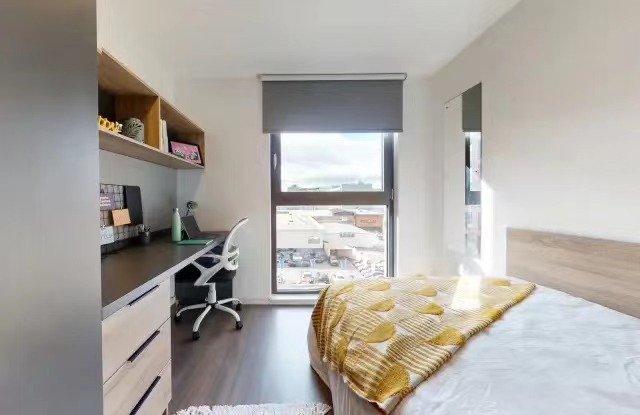
Glasgow
Glasgow’s universities are popular destinations for international students. Our Glasgow accommodation is in prime locations, just a short walk from Glasgow’s leading universities.

Edinburgh
Edinburgh is also home to one of the oldest universities in the UK, the University of Edinburgh, which is still one of the world’s leading universities.

Leeds
Our Leeds student accommodation ensures a comfortable and rewarding student life, offering various housing options tailored to suit different preferences and budgets.
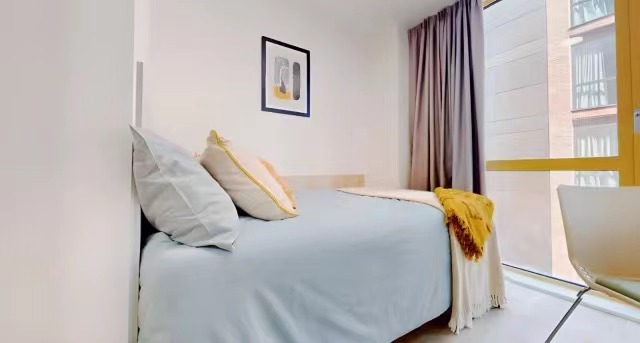
Nottingham
Most of these student accommodations in Nottingham are conveniently close to renowned universities, such as the University of Nottingham and Nottingham Trent University.

Sheffield
If you are pursuing high-quality educational resources and research strength in a vibrant and enjoyable environment, Sheffield University is a good choice globally.

Southampton
The University of Southampton has grown to become a top international university with a capacity of 20,000 students and one of the best research universities in the UK.
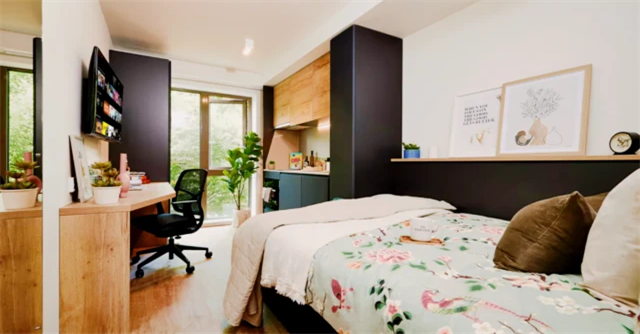
Coventry
Coventry is an educational hub for international students. Several higher education institutions, including Coventry University, serve the city, which offers a wide range of teaching resources and attracts students worldwide.
Liverpool
Liverpool, a port city in the northwest of the United Kingdom, is one of the eight core cities of England, with a population of about 520,000 people. Liverpool also has a large student population.
Newcastle
Home to two major universities, Newcastle University and Northumbria University, Newcastle enjoys a youthful, diverse population, creating a lively atmosphere.

Exeter
The University of Exeter in the city is one of the oldest universities in the UK. Over 30,000 students from over 150 countries live and study here.
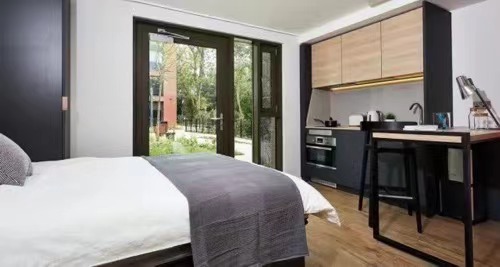
Birmingham
Birmingham has three world-renowned universities, which makes it one of the most popular study destinations.
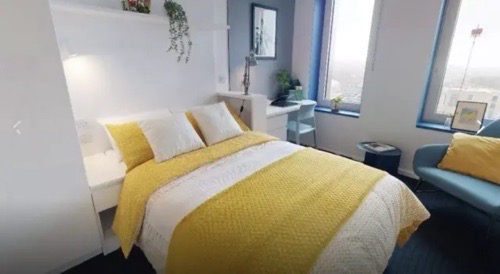
Brighton
Brighton has an excellent reputation as a student city with many universities and international students worldwide.
How to Use UCAS Clearing?
Step 1: Getting relevant advice
Before you start the application process, it is recommended that you consult widely to get relevant advice and guidance. You can explore the possibility of studying courses in different subjects, taking into account your career development plan and study programme. In this way, you will be able to have a relatively wider range of choices.
Step 2: Find a programme with open top-up places
Students who wish to submit an application through the top-up system can use the UCAS website’s search engine to find courses with open places. During this process, if you are unable to find the course you wish to apply for, then we recommend that you do so:
- Consider applying to different courses. Without changing your initial planning, we recommend that you consider different courses within the same field or take a double degree course once you have entered the institution.
- Keep checking the system. Institutions keep updates on the number of places available for top-ups, so we recommend that you keep checking the system.
- Check the course information to check the curriculum, teaching arrangements, and admission requirements of the relevant courses.
Step 3: Contact the institution you wish to apply to
During the top-up process, applicants must submit their applications through the UCAS system, and also complete some work outside of the system. Students who wish to submit a top-up application can call, email, or contact the institution concerned in other ways. The institution will consider the student’s personal circumstances, and the student will use this opportunity to explain their qualifications, background information, and motivation for applying to the institution. If the student’s application meets the institution’s requirements, an unofficial offer will be made through direct communication.
If the student receives unofficial offers from different schools at the same time, the student can make a choice based on factors such as accommodation, school location, and school environment.
Step 4: Adding a supplementary admission option to the system
Once applicants have been given a verbal or provisional offer from a school, students can fill in the UCAS system with the schools and courses they have applied for to ensure they are accepted.
UCAS Clearing Opening Times
Clearing will run from 5 July 2025 to 20 October 2025.
- 2025 Supplementary Recruitment Key Time Points
- 5 July: Clearing System Officially Opens
- 6 July: IB results released, one of the peaks for supplementary admission
- 16th July: HK DSE results release
- 14 August: A-Level results released, the most intense phase of Clearing
- 20 October: Clearing supplementary admission channel officially closes
Popular Universities Clearing Information
Top G5 Universities in the UK
University of Oxford, University of Cambridge, Imperial College, and the London School of Economics and Political Science (LSE) do not participate in supplementary admissions.
University College London (UCL): G5 is the only open by school, but the policy changes, high performance requirements, and the quota ‘second no’, want to apply for UCL students not only to fight the ability to obtain information, academic performance, but also to fight the “speed of hand! “The UCL website has been updated with the latest information on the number of places available.
Currently, the UCL website has updated the list of supplementary admission courses, but it does not distinguish between local and international students. According to historical data, the following colleges are more likely to release international student places:
- School of Engineering: Civil Engineering, Biochemical Engineering
- School of Mathematics and Science: Chemistry, Maths and Physics.
- School of Built Environment: Urban Planning, Sustainable Design
- School of Social Sciences: Economics, Geography
For A-Level candidates, the real prime time to apply is concentrated in the 48 hours after A-Level results are released on 14 August; students need to check the remaining places on courses via the designated page on UCL’s website after the scores are released, and by registering their interest now they can receive updates on vacancies as and when they become available.
| University | Academic Requirements |
|---|---|
| University of Nottingham | Confirmation with the university on whether grades meet requirements |
| Queen Mary University of London | Minimum accepted AL BBB, for details, please consult GEA evaluation and recommendation |
| Newcastle University | Confirmation with the university on whether grades meet requirements |
| University of York | Minimum accepted AL BBC, for details, please consult GEA evaluation and recommendation |
| University of Dundee | AL: BCC-CCD IB: 24-30 DSE: 444 |
| University of East Anglia | Confirmation with the university whether grades meet requirements |
| Aston University | Minimum accepted AL CCC; for details, please consult GEA evaluation and recommendation |
| University of Sussex | AL: BBB-CCC (TBC) IB: 28-30 DSE: 433-444 |
| Brunel University of London | Minimum accepted AL DDE, for details, please consult GEA evaluation and recommendation |
UCAS Clearing: UK QS Top 100 Universities
UCL Clearing Courses
Archaeology
Audiology and Audiological Sciences
Biological and Life Sciences
Biomedical Sciences
Cancer
Civil, Environmental and Geomatic Engineering
Classical World
Construction and Project Management
Education
Hebrew and Jewish Studies
History
History of Art
Humanitarian Studies
Infection and Immunity
Languages and Culture Studies
Linguistics, Language Sciences and Speech Therapy
Management
Medical Science and Applications
Nutrition and Dietetics
Public Health and Epidemiology
Security and Crime Science
Sustainable Built Environments
The Americas
The University of Edinburgh Clearing Courses
Business
Accounting and Business
Accounting and Finance
Business and Economics
Business and Law
Business with Decision Analytics
Business with Enterprise and Innovation
Business with Human Resource Management
Business with Strategic Economics
International Business
Computational Physics
Mathematics
Applied Mathematics
Economics and Mathematics
Mathematics
Mathematics and Business
Architecture
Architecture
Architectural History and Heritage
Biological Sciences
Biological Sciences
Biological Sciences (Ecology)
Biological Sciences (Genetics)
Chemistry and Physics
Astrophysics
Chemistry
Chemical Physics
Chemical Engineering
Languages and Culture
Ancient History
Classical Studies
English Language
Law
Law and Sociology
Law and Social Policy
Law and History
Law and International Relations
Archaeology
Archaeology
Archaeology and Social Anthropology
Sport
Applied Sport Science
The University of Manchester Clearing Courses
Accounting BSc
Accounting and Finance BAEcon
Business Accounting with Industrial/Professional Experience BSc
Finance BAEcon
International Business, Finance and Economics BSc
International Management BSc
Management BSc (including several specializations):
Management (Accounting and Finance)
Management (Human Resources)
Management (Marketing)
Management (Innovation, Strategy and Entrepreneurship)
Management (International Business Economics)
Fashion Marketing BSc
Information Technology Management for Business BSc
Computer Science
Computer Science BSc
Computer Science with Industrial Experience (4 years)
Computer Science with an Integrated Foundation Year BSc
Information Technology Management for Business BSc (cross between Computer Science and Business):
Information Technology
Management for Business with Industrial Experience
Humanities and Social Sciences
American Studies BA
Archaeology and Anthropology BA
Drama and English Literature BA
English Literature BA
English Language and Literature joint degrees (e.g., with French, German, Spanish)
History BA
Philosophy BA
Politics and International Relations BSocSc
Liberal Arts BA
Development Studies BAEcon
Education BSc
Sociology BSocSc
Social Anthropology BSocSc
Criminology BA
Digital Media, Culture and Society BA
International Disaster Management and Humanitarian Response BSc
Engineering
Chemical Engineering BEng / MEng
Chemical Engineering with Industrial/Professional Experience MEng
Chemical Engineering with Study in Europe MEng
Civil Engineering BEng / MEng
Civil and Structural Engineering MEng
Electrical, Electronic & Mechatronic Engineering (including Foundation)
Planning and Real Estate BSc / MPlan
Planning with Professional Placement
Architecture & Urban Planning
Architecture BA
Architecture with Foundation Year BA
Master of Planning with Real Estate MPRE
Planning and Real Estate BSc
Planning with Professional Placement MPlan
University of Bristol Clearing Courses
Business and Management
Accounting and Finance (BSc)
Accounting and Management (BSc)
Finance (BSc)
Marketing (BSc)
International Business Management (BSc)
Economics and Finance (BSc)
Economics and Politics (BSc)
Science & Life Sciences
Biochemistry (BSc)
Biology (BSc)
Chemistry (BSc)
Chemical Physics (BSc)
Cellular and Molecular Medicine (BSc)
Applied Anatomy (BSc)
Palaeontology and Evolution (BSc)
Mathematics & Data Science
Data Science (BSc)
Mathematics (BSc)
Mathematics and Philosophy (BSc)
Engineering & Technology
Civil Engineering (BEng)
Literature, Arts & Humanities
English (BA)
English and History (BA)
English and Philosophy (BA)
Theatre and English (BA)
Theatre and Film (BA)
Film and Television (BA)
Music (BA)
Classics (BA)
Comparative Literatures and Cultures (BA)
Liberal Arts with Study Abroad (MLibArts)
Social Sciences & Education
Criminology (BSc)
Sociology (BSc)
Anthropology (BA)
Childhood Studies (BSc)
Education Studies (BSc)
International Social and Public Policy (BSc)
University of Birmingham CLearing Courses
Business and Management
Accounting and Finance BSc
Money, Banking and Finance BSc
Economics BSc
International Relations with Economics BA
Science & Life Sciences
Physics with Particle Physics and Cosmology BSc
Physics with Medical Physics BSc
Physics with Data Science BSc
Mathematics & Data Science
Mathematics with Business Management BSc
Theoretical Physics and Applied Mathematics BSc
Mathematics and Computer Science BSc
Engineering
Aerospace Engineering BEng
Mechatronic and Robotic Engineering with Industrial Year MEng
Mechanical Engineering (Automotive) BEng
Engineering BEng
Energy Engineering BEng
Computer Science
Artificial Intelligence (AI) and Computer Science BSc
Artificial Intelligence (AI) and Computer Science with a Year in Industry BSc
Computer Engineering BSc
Culture and Media
Cultural and Creative Industries BA
Digital Media and Communications BA
Drama and Creative Writing BA
Drama and Film BA
Humanities and Social Sciences
Ancient History BA
Ancient History and Archaeology BA
Classical Literature & Civilisation and Philosophy BA
Policy, Politics and Economics BA
Social Sciences and Education
Education BA
Education and Sociology BA
Theology and Religion BA
Law
Law LLB
Law with Business Studies LLB
Law with Criminology LLB
International Law and Globalisation LLB
University of Glasgow Clearing Courses
Business
Accountancy (BAcc)
Accountancy with Finance (BAcc)
Accountancy with International Accounting (BAcc)
Accountancy with Languages (BAcc)
Accountancy/Economics (BAcc)
Accounting & Statistics (BSc)
Business & Management (MA (SocSci))
Business Economics (MA (SocSci))
Finance (BFin)
Science & Life Sciences
Archaeology/Environmental Geoscience (BSc)
What Kind of Students are Eligible for UCAS Clearing?
There are four main categories of students who are suitable for UCAS Clearing.
Students who have not received any offers: Students who have been rejected by all applicants in the regular application process or who have not been offered a place at the UCAS Extra stage.
Students who have not met the requirements of their original offer: Students who have been offered a conditional offer but have been dropped by their original institution because their final exam results did not meet the requirements.
Missed the 30 June application deadline: New applicants who did not submit their application by 30 June (applications submitted after 18.00 on 30 June will automatically be entered into Clearing).
Unsolicited Offer: New applicants who have been offered an unconditional offer but have changed their mind and used the ‘Decline my place’ function to withdraw from the offer will be admitted to Clearing (until 3 September).
Students who have completed their first year of study but wish to change their major or transfer to another university.
Factors to Consider When Choosing Clearing Accommodation
1. Location
Prioritise accommodation options that are close to the university campus or easily accessible. Proximity to academic buildings, libraries, and campus facilities can save commuting time as well as make it easier to participate in campus activities. It is also important to check if the accommodation is close to a bus stop, an underground or a school shuttle bus route.
2. Rental Budget
Set a rental budget based on your financial situation. It is important to note that some student residences may have utilities included in the rent, while private accommodations may require a separate payment. Check the total cost in advance to avoid exceeding your budget.
3. Room Type and Facilities
Choose a suitable room type (e.g. single room, Studio, En-suite, etc.) according to your personal needs. Confirm whether the room has basic furniture, a separate bathroom, a kitchen, etc., whether internet is available, whether utilities are included, whether there is a laundry room, a common space and other facilities.
4. Flexibility of Rental Period
The clearing period is relatively temporary, and many students only decide on their schools before September. It is recommended to prioritise accommodations with flexible rental periods, short-term rentals, or early withdrawal options to avoid signing long-term leases, which can lead to wastage.
5. Guaranteed Accommodation
Some universities offer a limited number of guaranteed accommodations for Clearing students, but the number of places is limited, so it is important to apply as early as possible. Some universities also work with third-party accommodation platforms that can recommend suitable properties simultaneously.
6. Social and Safe Environment
Consider the safety and neighbourhood around your accommodation. Regular student flats usually have access control and security at the front desk; if you are looking to make friends, it is better to choose a flat with a high concentration of students and an active social scene.
Other Factors to Consider
- How much is the deposit? When do I get my money back?
- Do I prefer quiet and independence, or would I prefer to share a room?
- Do I need a private bathroom and kitchen?
- Is the lease term flexible? When can I move in?
- Is there a communal kitchen, lounge area, study room, etc.?
- Is there 24-hour access or security?
- Is the neighbourhood of the flat safe? Is it safe to go out at night?
What to Do After Booking Clearing Accommodation
1. Confirm Accommodation Booking Information
Once you have completed your booking, you will need to check and confirm the confirmation email or platform notification sent by the accommodation provider. Ensure all information is accurate, including check-in date, check-out date, rent amount, payment plan, room type, exact address, etc.
2. Paying the Deposit and First Instalment of Rent on Time
Most student accommodations require a deposit or part of the rent to be paid as confirmation within a specified period of time. Please be sure to pay attention to the payment deadline and keep the proof of payment. Also, find out about the refund policy for deposits.
3. Sign Your Accommodation Contract
Many student residences will ask you to sign a tenancy agreement online once you have confirmed your booking. Be sure to read the terms and conditions carefully before signing, including the rental period, cancellation policy, compensation for damages, and visitor rules.
4. Prepare Relevant Documents for Moving in
Before you officially move in, you may need to submit some documents, such as a copy of your passport, letter of acceptance (Offer), proof of visa, payment vouchers and so on. Some student residences may also require a health declaration or emergency contact information.
5. Arrange Move-in and Pack Your Bags
After confirming your move-in date, you can start planning your trip, including booking flights, arrival transport arrangements and so on. Meanwhile, prepare the necessities such as bedding, cutlery, clothing, personal items and adapter plugs.
6. Join a Flat Community or Student Group
Many student flats or university organisations set up WhatsApp, Telegram or Facebook groups to help new students communicate and adjust to life in advance. Joining these groups allows you to get to know your flatmates, learn about what to expect when you move in, and get involved in social activities organised by your flat, so you can build a good foundation for your new life.
Book Clearing Accommodation at uhomes.com
Finding high-quality student accommodation in UK could be quite challenging because of the sheer number of students. uhomes provides free assistance to students in locating the best and most economical student accommodations in the UK. When you book student accommodation with uhomes.com, you’ll be provided with a booking executive. We even have 24-hour support for your convenience. All of the accommodations on the platform are completely furnished, ensuring a comfortable living environment and a stress-free university experience.
With uhomes.com servicing 100,000+ students globally, become a part of our ecosystem and receive the best support to help your study abroad ambition in the United Kingdom thrive. uhomes.com can help you find the best student accommodation in the UK to make your study abroad experience more meaningful.
If you would like to find out more about student accommodation in UK, please click on our Clearing Accommodation discount. Come and order your UCAS clearing accommodation now!

Floor Plan & Room Details
Get to know room number, orientation, floor plans and roommates.

100% Verified Properties
What you see is what you get. Our promise.

Price-Match Guarantee
Find a lower price and we’ll match it.

1-on-1 Professional Support
Just one call away, we’ll be there for you around the clock.
FAQs
Why choose accommodation for students at uhomes.com?
As a reliable student housing platform, uhomes.com guarantees you with quality and verified properties. The main features of our student rooms include:
· Vast range of student properties with 2M+ beds
· Verified properties for your peace of mind
· User-friendly property website
· Transparent pricing and policies
· Partnership with reputable accommodation providers and educational institutions
· 1-on-1 Professional customer support
· Exclusive student discounts on student apartments
What types of accommodations are available for international students?
uhomes.com provides various student lodges all over the world, including:
· Shared rooms
· Private student accommodation
· En-suite rooms
· Non-En-suite rooms
· Studios flats
· 1-B/2B/3B/4B/5B+ Bedroom apartments
How to book student houses with uhomes.com?
Find the right student accommodation in just 3 steps:
Step 1: Log on to uhomes.com to view all student flats.
Step 2: Select the UK city you need, and you will see all the student flats. Filter them by distance or price and click ‘Apply Now’ if you are happy with any of them.
Step 3: If you have any questions, you can click ‘Enquire Now’ to contact our professional student rental consultants.
Once you have chosen the right student accommodation, you can book it, confirm it, and sign the rental agreement by following the clear instructions on uhomes.com.
How to find apartments for students online?
You can book student accommodation in the UK that you are happy with through uhomes.com. You can log on to uhomes.com to browse student accommodation in various cities in the UK, find the one you like and book it directly, or you can contact our team of consultants who can help you to book a flat in the UK. Please contact us as soon as possible. If you have any questions or are unsure, please contact us.
When can I apply for Clearing?
Available from July to October each year. Pay attention to the following situations.
1. If you already have test scores but no offer, you can choose July Clearing.
2. If you have a conditional offer but the test scores are not up to plan, you can Clear from the results date. The search toolbar will list the Clearing vacancies.
3. If eligible, you can add Clearing options at 14:00 (UK time) on results day (10 August).
4. If there is a first choice but you change your mind, you can decline the position in Track.
What does my student room rent include?
uhomes.com student accommodation rent usually involves utility bills, such as water, electricity, internet access, and gas. And the fitness facilities, public lounge, student areas, games room, cinema rooms, etc. provided are generally free to use. Anyway, it’s always wise to double-check your student flats’ cost with your consultant before signing the contract.
How do I add Clearing?
Go to the Your choices section of Track and click Add Clearing choice and enter the course details. Only add the Clearing option if permission has been obtained from the University.
How do I respond to a Clearing offer?
You do not need to reply to the Clearing offer. After adding the option, uni will confirm your position in Track.
I don't want to stick to my first choice, can I clearing?
Yes, you can. If you change your mind and no longer want your first choice, you can use the decline my place button in Track.
Why isn't Track updated?
The track will be updated as soon as the University makes a decision. If you meet the eligibility criteria, your place will be confirmed shortly.
Can I swap my first and second choice after I get my results?
You cannot exchange your first and second choice. If you want to choose your second choice, you need to go through Clearing and contact to confirm whether there is still a place in your second choice university, wait for the school to confirm to send out the offer, then declare my place and go to Clearing to add the supplementary application.
I only applied to 3 schools before, can I apply to another 2-3 schools in Clearing?
You can only add one school and programme at a time when Clearing, and you can only add a second one if that school and programme rejects you.
The school requires AAB, but I only have ABB, do I still have a chance of getting in?
There is a chance that some schools’ Clearing stage requirements may be lowered, and it is recommended that you follow the steps above to contact the school to confirm whether or not a discretionary point reduction is offered.
What is the UCAS clearing eligibility
According to UCAS, students are eligible to apply at the top-up stage if they meet any of the following criteria.
– Submitted their application after 30 June;
– Have not received an offer from a school in the first round of applications or have not accepted an offer from a school in the first round of applications;
– Failed to fulfil the requirements set out in the conditional offer letter;
– Candidates have declined a first-choice offer.
What two situations arise where a UCAS top-up cannot be made?
Firstly, if you have met the requirements of both the FIRM and INSURANCE schools, you may not apply to another school through the Supplementary Admissions.
Secondly, if you cannot get into a firm choice school but meet the requirements of an insurance school, you cannot apply to another programme through supplementary admission.
What do applicants need to do before entering the UCAS top-up process?
Applicants first need to make good enquiries about the universities they are interested in before entering the UCAS top-up process. It is important that applicants prepare for this in advance, however, being able to communicate with the university is also a very important aspect. Most schools want to speak directly to applicants and communication between the two parties is usually done over the phone.

